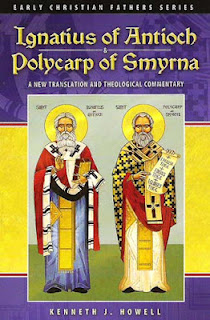Today we continue our regular series here at The Thin Veil called “Learning from the Saints”. Our guide is saint-expert Bert Ghezzi, a dear friend of mine and the author of numerous books including Voices of the Saints, Saints at Heart, and Adventures In Daily Prayer.
His newest book is Discover Christ: Developing a Personal Relationship with Jesus. You can learn more about Bert and his work at www.BertGhezzi.com.
Today, Bert shares the intriguing story of St. Polycarp, an early saint with great courage and spunk whose feast day is today.
In the second century, Polycarp was the revered elder statesman of the Church in the East. He was a second-generation apostle who had personal contact with the Twelve. According to tradition, he was appointed bishop of Smyra by St. John himself.
For more than half a century, Polycarp devoted himself to teaching sound doctrine and opposing heresy. Once on a visit to Rome he had snubbed the heretic, Marcion. “Don’t you know who I am, Polycarp?” Marcion asked. “Oh, yes,” said the saint, “I know the firstborn of Satan when I see him.”
At mid-century, governors began to require Christians to worship the emperor, yet many chose death instead of blasphemy. Mobs packed the amphitheater in Smyrna to watch as faithful Christians, refusing to worship other gods, were forced to fight wild animals. One day when a Christian youth encouraged the beasts to devour him, the crowd went berserk. They began to chant, “We want Polycarp! We want Polycarp!”
Polycarp was in hiding on a farm outside of town. But a search party forced a servant to betray him. When the police arrived to arrest him, Polycarp surprised his captors by feeding them and then asking for time to pray. Once done with food and prayer, they took him to the amphitheater.
Here is the account as told in The Martyrdom of Polycarp, a circular letter the Smyrnean church distributed after his death:
“A great shout arose when the people heard that it was Polycarp who had been arrested. As he was brought before him, the governor asked him: ‘Are you Polycarp?’ and when he admitted he was, the governor tried to persuade him to recant, saying: ‘Have respect for your age…; swear by the Genius of the emperor. Recant. Say, ‘Away with the atheists!’
(Editors note: It might sounds strange to modern ears, but Christians were actually considered atheists in the first-century world, due to their refusal to worship the multiple Greek and Roman gods. Polycarp here was being asked to deny all Christians by saying, ‘Away with the atheists!’ As we see, he turned the tables on the crowd by deeming *them* the true atheists.)
“Polycarp, with a sober countenance, looked at all the mob of lawless pagans who were in the arena, and shaking his fist at them, groaned, looked up to heaven, and said: ‘Away with these atheists!’
“The governor persisted and said: ‘Swear and I will let you go. Curse Christ!’
“But Polycarp answered: ‘For eighty-six years I have been his servant and he has done me no wrong. How can I blaspheme against my king and savior?'”
The governor continued to press Polycarp, but he did not flinch at the threat of the wild animals or of being burnt alive. Polycarp must have raised an eyebrow at the latter warning, as a few days before he had dreamt that he would die by fire. When the governor announced that Polycarp had declared himself a Christian, the frenzied mob gathered wood for his pyre.
Polycarp submitted peacefully to his death, even asking not to be nailed to the centerpole. He prayed briefly and the fire was lit. Witnesses later reported that something miraculous happened to the flames, which:
“bellying out like a ship’s sail in the wind, formed into the shape of a vault and thus surrounded the martyr’s body as with a wall. And he was within it not as burning flesh but rather as bread being baked or like gold and silver being purified in a smelting furnace.”
Since the fire was not consuming Polycarp, the governor had one of his men plunge a dagger into him. The death of the bishop climaxed and ended the persecution. And the report of his martyrdom engendered faith and courage throughout the still very young Christian church.
For more about St. Polycarp check out Dr. Kenneth Howell’s excellent translation of the works of Ignatius of Antioch and Polycarp of Smyrna.
(Image credits: Full of Grace and Truth)
Read more from Bert at his website, www.BertGhezzi.com, or check out his many books on Amazon.
 |
 |
 |



